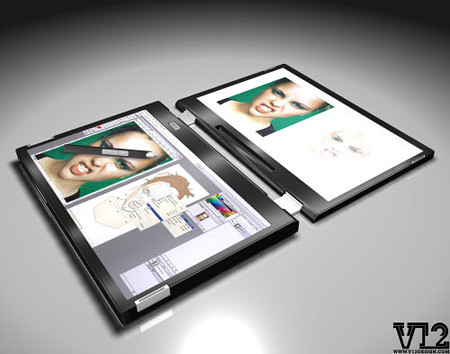 I had a go on an Acer Iconia twin screened laptop whilst ambling through an HMV the other day, and it inspired me to make this comment – this should be in contention for one of the worst pieces of computer design ever. Admittedly I played with it for all of three minutes so take my comments with a pinch of salt, but, in brief: it’s just terrible.
I had a go on an Acer Iconia twin screened laptop whilst ambling through an HMV the other day, and it inspired me to make this comment – this should be in contention for one of the worst pieces of computer design ever. Admittedly I played with it for all of three minutes so take my comments with a pinch of salt, but, in brief: it’s just terrible.
It’s not that there’s anything inherently wrong with the stylings or construction of the device itself – it looked and felt sturdy. But a screen as an input device and a second screen as a screen? What were they thinking?
Here’s a few reasons why this concept will suck totally for a while.
- Battery life must be terrible. Laptopmag worked it out at around 2.5 hours but I’m dubious – given that my 7 hour rated Macbook Air gets 3.5 hours the way I use it I can’t see anything like this working for anyone for any period of time.
- It’s big, heavy and too bulky for any normal work surface, at home or in the office – unless maybe you’re a designer.
- The form factor and the OS make no sense. I’ve commented before about Windows 7 and touch – not there yet. But even if it did (as Windows 8 looks to do), what, would you occasionally hold this thing like a giant book? Stretch it flat and look at it sideways? What? Why? How?
It’s too expensive a novelty. People, if you’re trying to beat out Apple the iPad you’ve got to try harder and come up with better ideas than expensive novelty props.
